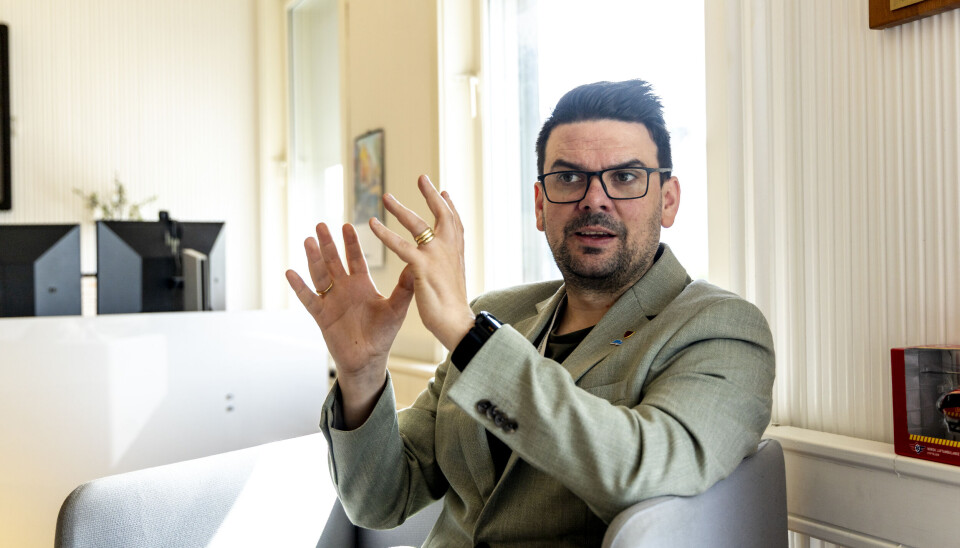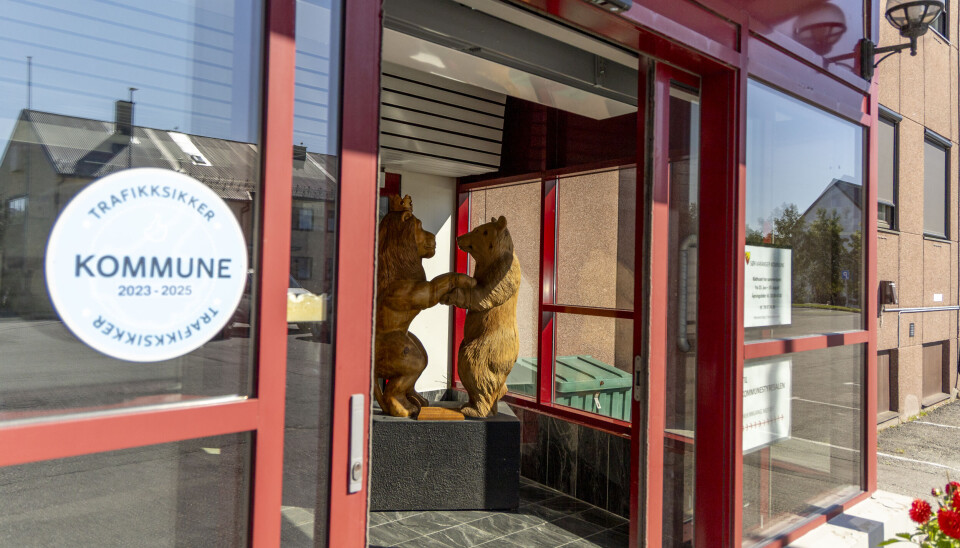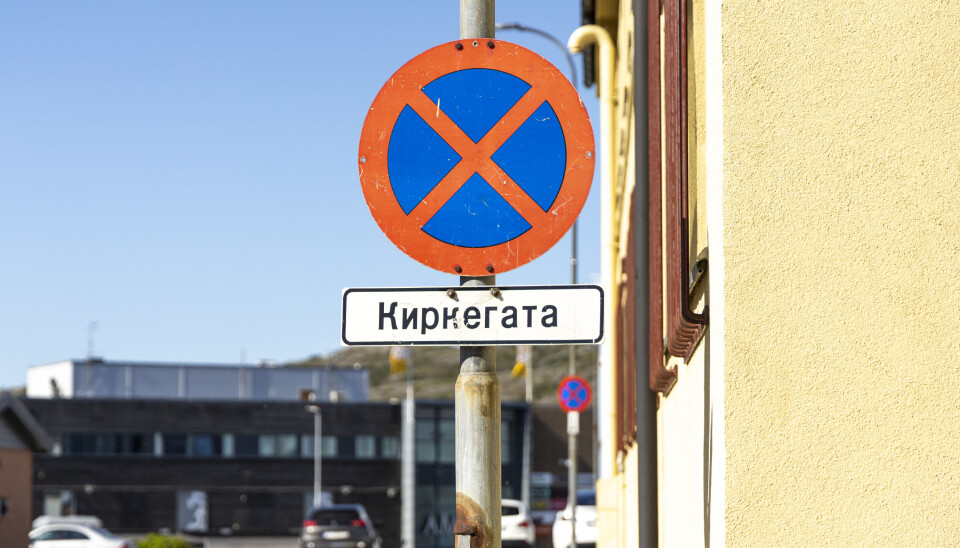
"It's not in my interest to have contact with Russia."
Russia poses a security threat to the world, says Magnus Mæland, mayor in the Norwegian border town that for decades built its identity on east-west cross-border contacts and travel.
The Town Hall in Kirkenes is just opposite the Russian consulate, but it does not maintain contact with its neighbours.
“Russia has become an authoritarian regime. Contact on a municipal level is not possible anymore,” says Magnus Mæland, mayor of Sør-Varanger to the Barents Observer.
“It's not in my interest to have this kind of contact with Russia, because it's a security threat to the world.”
A regular sight at demonstrations in support of Ukraine, the 41-year-old mayor wants to tighten cooperation with the rest of the Nordics, especially Finland.
Sør-Varanger has always been a sister city of Inari, Finland, and collaboration became trilateral at the end of the Cold War to include the Russian municipality of Pechenga.
Kirkenes was branded as the capital of Barents Cooperation, a multilateral platform aimed at promoting businesses and people-to-people contacts with northern Russia. The town became a venue for diplomats, foreign ministers, and international delegations, and was promoted by Norway as a display window for building soft-power security.
Fittingly, the highest-standard highway out of Kirkenes was built in the direction of the Russian border.
Mæland says that after Russia’s full-scale invasion of Ukraine, it was important to tighten the bonds with Finland even more. “We share the same values, culture and people. Especially with Lapland and Inari.”
The mayor of Inari, Tommi Kasurinen, confirms the increased contact.
“We have a new friendship agreement that was signed at the beginning of the year. We meet twice a year and cooperate on issues like security of supply, roads and infrastructure, attracting talent, tourism as well as anything else that concerns the both of us.”
Elected in 2023, Mæland campaigned on changing the course of international collaboration. He says it’s a lot easier to work with countries that share the same values. That means more focus on the Nordics, EU and NATO. With the Finnish and Swedish membership in NATO, this gets a whole new meaning.
Security plays a big part in the mayor’s work. He emphasizes that he doesn’t have anything to do with national defence policy, but that total preparedness is a key element.
“When you talk about roads and infrastructure, you have to be aware of the dual purpose of it. For example, the roads need to be good enough to bear a lot of heavy equipment.”
While the highway to the Russian border is top standard, the road connecting Kirkenes with Finland is a bumpy challenging drive among potholes, sharp curves and narrow passageways.
“It’s important that I as mayor and the mayor of Inari are in agreement concerning our wishes for defence and security.”
The northern regions of Norway and Finland directly border the Kola Peninsula, a military stronghold for Moscow where warships and submarines have ice-free ports with access to the North Atlantic.
“We are [geographically] within Russia's bastion defense concept," Mæland explains. The naval component of the strategic nuclear weapons are based a short 100 kilometers from the border. "Those weapons are not directed at Norway, but we are the eyes and ears of the high north for NATO."

A key element in Mæland’s vision for the future is to attract talented people to come to Kirkenes. The municipality has a dedicated business development team. “It has been important to keep up that effort, even in times of economic difficulties.”
“We have to put our energy into collaboration in the high north to create stronger ties between businesses and people,” the mayor says with enthusiasm.
In addition to business opportunities relying on natural resources in and around Kirkenes, Mæland raises the need for high competence tech jobs. “We can't just exploit our natural resources, we always have to include a tech component to it. Then we can create high competence jobs that create job mobility.”
“My generation, and younger, change jobs maybe seven times in a lifespan. If there aren't opportunities in the north, then you will move to a place where there are more possibilities.”
“We can’t just live by selling raw materials to the world. We have to make products. We have to have the technology and competence to exploit those resources to a higher degree. To create more value, more jobs, and new technology.”
Magnus Mæland sees cooperation with northern Finland as key to develop this value chain.
Population grows older
Despite bold wishes to attract talent, Mæland fears a negative trend in demography.
“The future we share between the northern part of Norway and Lapland is that there will probably not be a lot more people moving to this region.”
As the population grows older more people will need healthcare and there will be less people to provide it. “So then we have to utilize every aspect of technology that is available. We have to create something ourselves.”
Eco-damage for a greener future
Talking about mining and its impacts on the environment, Magnus Mæland has a clear view.
“Every business has effects on the environment, but I’m just tired of the European double standards when it comes to minerals. It’s like ‘not in my backyard’, but we don’t have any worries about being hugely dependent on countries we don’t have security cooperation with and who really do not care about environmental laws or rehabilitation of the environment.”
Aside from environmental impact, Mæland says it is also a question about limiting climate change. “We need those minerals for the green transition.”
“It’s a complex issue, but in my mind it’s quite simple: In the geopolitical environment we have today, do you want to be dependent on authoritarian and totalitarian states when it comes to energy, minerals, medical supplies, or do you want European autonomy and a Europe that can be self-sufficient?”
“If you want development, if you want to harvest the natural resources, you must be allowed to do so. You can’t use decades to say yes or no to a mine as we did in Hammerfest in Kvalsund with Nussir,” the Kirkenes mayor argues.
Tourism
Comparing Finnish Lapland to Norway, Mæland acknowledges that in terms of services like hotels and restaurants, the former is more developed for tourism. “In Finland the tourism industry is a necessity, a lifeline. In Norway it’s a side gig, since we earn a lot of money on oil and gas. But here in Sør-Varanger, the travel industry is a lifeline.”
Mæland takes the example of the Snowhotel outside Kirkenes.
“We are the only municipality that has a snow hotel in the summer”, he jokes.
The hotel has 40 full-time jobs and 100 more seasonal ones. This creates opportunities and new investments. “My job is to make sure those investments are safer,” Mæland says.
Tourism’s impact on climate change is also something to consider. “Of course when people travel to the high north, they come by plane. With a lot of CO2 emissions. So to be sustainable the tourists will have to stay here for a lot more days.”
“And of course that gives incentives for green fuel and energy. I’m a tech optimist. I believe that humankind always finds solutions for our problems.”
After Russia’s full-scale invasion in Ukraine, Inari has had trouble with energy. The Finnish municipality used to import wood pellets from Russia, but they have to look elsewhere now.
“Our energy cooperation with Finland is important. This is also an issue of power grids,” Mæland says, encouraging building new connections for electricity between Finland and Norway in the north.
Although based in the remote periphery of Europe, the mayor sees himself as part of the center.
“My message is that we are the solution for both European strategic autonomy and for our security concerns in the Arctic.”
















